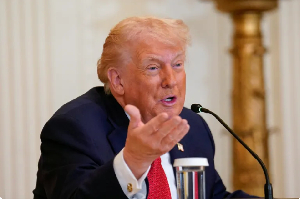The reason the United States of America, the United Kingdom, Canada, France, Germany, Israel and a few more are great is simple. In all these countries, people are truly governed by the rule of law, as opposed to the rule of man. The rule of man is the rule of money and of criminality. The rule of law on the other hand, is healthy order. It is duty of care, fairness, honesty, truth, accountability and justice for all.
In nations subject to the rule of law, judges cannot be corrupted by money or by illegal considerations in their court-decisions. Unfortunately, in 2015 Anas Armeyaw Anas provided shocking video evidence of how easy it was to bribe some judges in Ghana. Since that scandal, posters, books, workshops, sermons and messages warning people against corrupting judges have increased.
The truth is that those who engage in judicial corruption do not do so on TV or in open spaces. Thus we can never be sure that the exposure of the few have killed the business of judicial corruption in Ghana. Who knows the mind of every man? Who can tell us that to catch a criminal is to stop all crimes? As citizens of our beloved Ghana, we must be proud of our judges for their learning, for their sacrifices and for their priceless contributions towards our freedoms, our peace, our democracy and our development.
Nevertheless, from the Anas’ video evidence, we cannot be sure that that no judges are taking bribes and that no judge would ever take a bribe in order to rule unjustly. Thus, in order to reduce the possibility and illegal opportunities for the corruptible judge, we must examine the court system itself to determine whether certain weaknesses within it can be minimized to prevent or reduce judicial corruption in Ghana.
Whenever men can buy justice by bribing judges, those who have money can have no fear of the law in whatever they do. They therefore do what they wish and act with impunity. This makes the rich more equal than others and increasingly edges our nations towards tyranny. To maintain our rights and freedoms all democracies, including our own, must guard against the commodification and monetization of justice. Money and justice don’t mix. Justice should be a free good like air. Everyone should have equal access to justice whether they are rich or poor. A society in which richer folks can buy judgements is not only undemocratic and immoral, it is the theatre for wickedness and terror.
Single-judge courts are more corruptible
The judges who were caught on the Anas’ videos allegedly taking bribes were judges of the single-judge courts. If some judges are bribable as the tapes suggest, it is my view that it would be easier to bribe one single judge than a number of different judges forming a panel on one case. Three different judges may have three different characters. Apart from the fact that not all three may be accessible to the corruptor, they may have opposite intellectual, political, religion.
ethnic or judicial preferences that could prevent collusion. Corrupting three or more judges on the same case is therefore, more difficult. If therefore, we want to reduce corruptibility of judges of any given case, we are more likely to achieve same by removing the power of one single judge to rule, by creating a panel of judges for judicial decision-making as the rule rather than the exception.
Use technology to randomize selection & reduce opportunities
For added insurance, the judges that hear any case could be chosen at random by a technological system that prevents access to and forehand knowledge of the judges handling a matter. In addition, with the right technologies, every judge in any part of the country could be called to be a part of any panel hearing any case in any part of the country.
Reliable video and broadcast technologies exist that could allow for judges in different locations to be joined live without any diminution in sound or visuals in the same courtroom with the parties and their lawyers at the same time. When judges are chosen at random and they are distant from parties and their lawyers, it would be difficult for any person to have the audacity and the opportunity to attempt to bribe the judge.
Those who might feel comfortable approaching a familiar-judge with a bribery offer, may be scared to do so with distant judges they do not know. Random selection and inaccessibility of the judge guarantee further reduction in the possibility of corrupting a judge. We must take this very seriously and deploy all necessary human, legal and financial resources to ensure that this is done.
A panel of judges is more learned & more just
There are other reasons for preferring a panel of judges over a single judge. Apart from the greater corruptibility of the single-judge, a panel of judges creates more justice as I would explain below. In the normal course of things, a single judge takes charge of a proceeding from the beginning to the end and rules on it as he or she deems fit. Unless the case is appealed after the judge gives his or her judgement, what the single judge orders, is the law.
When the matter is appealed to the Court of Appeal however, the number of judges hearing the case increase from one to three. If the matter is further appealed to the Supreme Court, the number of Judges increases from three to a minimum of five. More judges are added to hear a case at the Supreme Court as deemed appropriate by the Court. This system of increasing the number of judges as we move higher on the legal hierarchy is not made in heaven but it has a historical context in the ideas, beliefs, experiences, knowledge and desires of English jurists from whom we inherited our current legal order.
The current system has its advantages but it cannot be said to be scientific or dictated by the laws of nature. A court proceeding presided over by a single judge seems more foreign than a court proceeding presided over by a panel of judges. This is because in reality, important decisions in our families, in our churches, mosques, communities and in our businesses are made by teams rather than by a single person. The system of single-judge courts is not universal. Nor is it dictated by the natural law. On the contrary, logic and science state that truth and justice are more likely to be achieved by a plurality of judges than from a single judge. We all know that two or more heads of similar learning are better than one. It is because a panel of judges is more likely to get the law right that the multiple-judge panel-system has been adopted universally by all courts for appeals.
There is no inherent bar or justifiable reason why the proposition that more judges are likely to get the law right and to be more just, cannot be applied to cases at lower courts. On the contrary, if all citizens are equal and therefore, all cases are equal, then all cases deserve the additional level of correctness and the justice that come with a panel of judges. This is more so given that for many reasons including poverty, frustration, uncertainties etc., most cases are determined at High courts by single judges and never appealed.
The fact that most cases are not appealed does not necessarily imply that the losers have no chances of success on appeal. Unless a matter is appealed and finally ruled on by the Supreme Courts it is scientifically not possible to say whether a loser at the High court would have lost on appeal or not. This leaves open the possibility that many of those who have lost at the High Court could have win at the higher courts had they appealed. In the end, only a Supreme Court ruling can confirm whether a high court ruling is just or not. Yet most people cannot afford the time and the resources required to appeal their cases to the Court of Appeal and to the Supreme Court.
Yet if we all agree that both in detail, in logic, in clarity, in comprehensiveness and even in the finesse of the law, a panel’s decision is better than that of the single judge, then we cannot justify a regime that hinders access to the panel as a matter of design. Let me make my point clearer by posing a simple question. Why should cases on appeal have access to greater justice than cases at trial?
Additional benefits of the panel-system
In my view if more judges on a case equal greater justice, then at least for the sake of the appearance of justice, losing a case decided by a panel of judges is more acceptable. Besides, to the extent that cases on appeal receive greater judicial attention by way of panels, those cannot afford appeals are being subject to avoidable discrimination. If it is said that a panel of judges at trial would cost more, justice does not have a price. Every society must do what is just regardless of the costs. If it costs more to get greater justice, we must prioritize our expenditures and we must find the resources to pay for greater justice.
The argument can be made that in so far as panel-decisions are more likely to be legally correct, they could reduce appeals, increase trust in the legal system and reduce appeal backlogs. Surely, these are efficiencies. Do we have a precedence for having a panel of judges at the High courts? Yes, we do have examples of these panels in our traditional systems. In the English and Canadian legal systems too, we have Divisional Courts where three judges of the High Court can sit as a panel to review certain decisions of a Master or of a single Judge. But even if we did not have precedence, we can create one. We are not slaves to precedence. The judicial system is there to serve man. To the extent that we need to amend our statutes to achieve greater justice, we must do so.
Conclusion
Corruption is both a matter of the character of the judge and of the institutional loopholes and opportunities that enable the weak to fall. It is not enough to preach to judges and litigants against corruption. Most if not all judges are honest and fair. Yet, for the few who are not, we must remove the temptation and the opportunities that make it possible to corrupt a judge. As a nation we need to do everything we can to reduce opportunities for the sale of justice. The ability to bribe any judge is a travesty, a mockery of social order and the evil father of tyranny. When a judge can be bought or bribed to give a judgement in favor of a party in complete disregard of right, of equity and of truth, everybody but the very rich is victimized and oppressed.
As more and more of our lives is monetized, the only refuge and security against the rise and rule of the mischief-makers and of the tyranny of man over man is the rule of law. We must as patriots, as reasonable people and as God-fearing persons take all reasonable steps to ensure that we protect and insure our justice system from the rule of money. I believe that courts presided over by a number of different judges as a panel for every case, is the surest antidote to corruptibility of judges. The Anas’ videos showed single judges taking bribes.
They did not show any member of any panel of judges presiding over a case, taking bribes. It is easier to bribe one than three, five, seven, nine or so judges. So let us amend the courts act, the rules of court and if necessary the constitution, to ensure that except for merely administrative or routine matters, all lower court cases are presided over by a panel of at least 3 judges. It's better to get it right the first time. It is more just and appears to be more just. Peace and justice to all men!
By: Nana Oppong, President of the Distinguished Scholars of Africa
Opinions of Monday, 3 September 2018
Columnist: Nana Oppong















